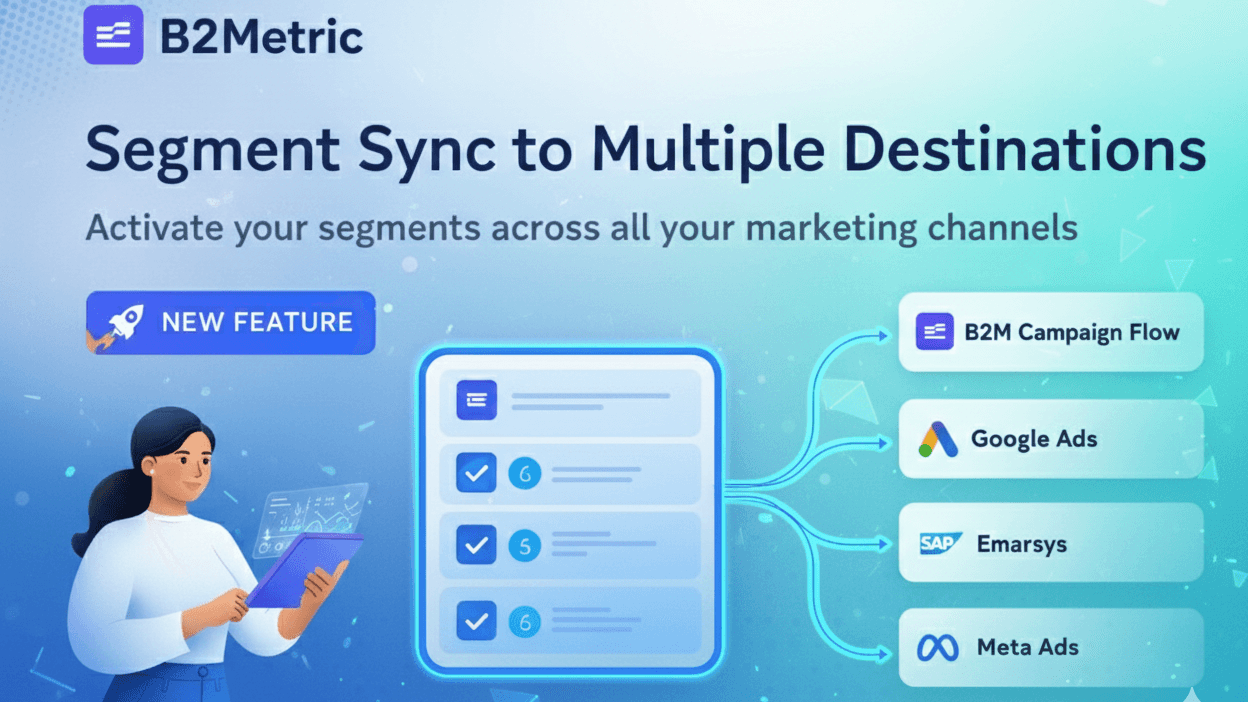Marketing and Analytics

Can Dinlenç
•
•
•
November 15, 2024
Nov 15, 2024
Nov 15, 2024
Nov 15, 2024




Black Friday is fast approaching, and with the excitement comes intense competition. Are you prepared? Predictive analysis can be the key to staying one step ahead. In this post, we’ll explore how predictive analysis can help you anticipate customer needs, optimize stock levels, and make real-time pricing adjustments—all crucial for thriving in retail and e-commerce.
What Is Predictive Analysis?
Predictive analysis uses historical data, machine learning, and big data to forecast trends and customer behaviors. By analyzing patterns in past Black Fridays, retailers can anticipate this year’s customer preferences, peak sales periods, and high-demand products. With predictive models, businesses aren’t just reacting to trends; they’re anticipating them.
How does it work? Imagine analyzing millions of data points—previous purchase histories, demographic insights, even online search trends. Tools like the B2Metric Customer Data Platform (CDP) integrate these insights, making forecasts more accurate. Big data helps pinpoint trends, while machine learning fine-tunes the forecast by continuously adapting based on new data inputs.
Key Predictive Metrics for Black Friday Success
What should you focus on in your predictive analysis for Black Friday 2024?
Customer Buying Patterns
Knowing your customer is key. By understanding who buys what and when, you can fine-tune your marketing and inventory. Predictive models help businesses identify buying patterns that show when customers are most likely to shop or what promotions catch their interest.
Inventory Forecasting
Ever run out of a top-selling product right in the middle of Black Friday? Predictive analysis allows businesses to forecast product demand, ensuring you have the right stock levels. It’s not just about having enough; it’s about optimizing to avoid overstocks or shortages.
Dynamic Pricing Strategies
Black Friday is the ultimate time for dynamic pricing. Predictive models monitor competitor prices and customer demand, enabling you to adjust prices in real-time for maximum competitiveness and profit. Why leave it to chance when you can stay in control?
How to Leverage Predictive Analysis for Black Friday 2024
Wondering how to get started? Here’s a quick roadmap.
Data Collection and Model Training
Successful predictions start with accurate historical data. By training models on past Black Friday data, you lay the groundwork for a reliable forecast. A strong CDP, like B2Metric’s, can help consolidate and prepare this data for accurate predictive models.
Real-Time Data Integration
During Black Friday, every second counts. Integrating real-time data with your predictive model gives you an edge, as you can adjust strategies in response to live changes, like a sudden spike in demand for a particular product.
Best Practices for Predictive Analysis
Combining Historical Data with Market Trends
Pairing internal data with broader market trends offers a more complete picture. Insights into industry-wide trends can help you anticipate shifts, like this year’s focus on eco-friendly and sustainable products.
Monitoring and Adjusting Predictions
Predictive analysis isn’t a one-and-done task. As new data flows in, it’s essential to adjust your predictions accordingly. Monitoring models and staying flexible ensures you’re making decisions based on the most accurate information available.
Black Friday is fast approaching, and with the excitement comes intense competition. Are you prepared? Predictive analysis can be the key to staying one step ahead. In this post, we’ll explore how predictive analysis can help you anticipate customer needs, optimize stock levels, and make real-time pricing adjustments—all crucial for thriving in retail and e-commerce.
What Is Predictive Analysis?
Predictive analysis uses historical data, machine learning, and big data to forecast trends and customer behaviors. By analyzing patterns in past Black Fridays, retailers can anticipate this year’s customer preferences, peak sales periods, and high-demand products. With predictive models, businesses aren’t just reacting to trends; they’re anticipating them.
How does it work? Imagine analyzing millions of data points—previous purchase histories, demographic insights, even online search trends. Tools like the B2Metric Customer Data Platform (CDP) integrate these insights, making forecasts more accurate. Big data helps pinpoint trends, while machine learning fine-tunes the forecast by continuously adapting based on new data inputs.
Key Predictive Metrics for Black Friday Success
What should you focus on in your predictive analysis for Black Friday 2024?
Customer Buying Patterns
Knowing your customer is key. By understanding who buys what and when, you can fine-tune your marketing and inventory. Predictive models help businesses identify buying patterns that show when customers are most likely to shop or what promotions catch their interest.
Inventory Forecasting
Ever run out of a top-selling product right in the middle of Black Friday? Predictive analysis allows businesses to forecast product demand, ensuring you have the right stock levels. It’s not just about having enough; it’s about optimizing to avoid overstocks or shortages.
Dynamic Pricing Strategies
Black Friday is the ultimate time for dynamic pricing. Predictive models monitor competitor prices and customer demand, enabling you to adjust prices in real-time for maximum competitiveness and profit. Why leave it to chance when you can stay in control?
How to Leverage Predictive Analysis for Black Friday 2024
Wondering how to get started? Here’s a quick roadmap.
Data Collection and Model Training
Successful predictions start with accurate historical data. By training models on past Black Friday data, you lay the groundwork for a reliable forecast. A strong CDP, like B2Metric’s, can help consolidate and prepare this data for accurate predictive models.
Real-Time Data Integration
During Black Friday, every second counts. Integrating real-time data with your predictive model gives you an edge, as you can adjust strategies in response to live changes, like a sudden spike in demand for a particular product.
Best Practices for Predictive Analysis
Combining Historical Data with Market Trends
Pairing internal data with broader market trends offers a more complete picture. Insights into industry-wide trends can help you anticipate shifts, like this year’s focus on eco-friendly and sustainable products.
Monitoring and Adjusting Predictions
Predictive analysis isn’t a one-and-done task. As new data flows in, it’s essential to adjust your predictions accordingly. Monitoring models and staying flexible ensures you’re making decisions based on the most accurate information available.
Black Friday is fast approaching, and with the excitement comes intense competition. Are you prepared? Predictive analysis can be the key to staying one step ahead. In this post, we’ll explore how predictive analysis can help you anticipate customer needs, optimize stock levels, and make real-time pricing adjustments—all crucial for thriving in retail and e-commerce.
What Is Predictive Analysis?
Predictive analysis uses historical data, machine learning, and big data to forecast trends and customer behaviors. By analyzing patterns in past Black Fridays, retailers can anticipate this year’s customer preferences, peak sales periods, and high-demand products. With predictive models, businesses aren’t just reacting to trends; they’re anticipating them.
How does it work? Imagine analyzing millions of data points—previous purchase histories, demographic insights, even online search trends. Tools like the B2Metric Customer Data Platform (CDP) integrate these insights, making forecasts more accurate. Big data helps pinpoint trends, while machine learning fine-tunes the forecast by continuously adapting based on new data inputs.
Key Predictive Metrics for Black Friday Success
What should you focus on in your predictive analysis for Black Friday 2024?
Customer Buying Patterns
Knowing your customer is key. By understanding who buys what and when, you can fine-tune your marketing and inventory. Predictive models help businesses identify buying patterns that show when customers are most likely to shop or what promotions catch their interest.
Inventory Forecasting
Ever run out of a top-selling product right in the middle of Black Friday? Predictive analysis allows businesses to forecast product demand, ensuring you have the right stock levels. It’s not just about having enough; it’s about optimizing to avoid overstocks or shortages.
Dynamic Pricing Strategies
Black Friday is the ultimate time for dynamic pricing. Predictive models monitor competitor prices and customer demand, enabling you to adjust prices in real-time for maximum competitiveness and profit. Why leave it to chance when you can stay in control?
How to Leverage Predictive Analysis for Black Friday 2024
Wondering how to get started? Here’s a quick roadmap.
Data Collection and Model Training
Successful predictions start with accurate historical data. By training models on past Black Friday data, you lay the groundwork for a reliable forecast. A strong CDP, like B2Metric’s, can help consolidate and prepare this data for accurate predictive models.
Real-Time Data Integration
During Black Friday, every second counts. Integrating real-time data with your predictive model gives you an edge, as you can adjust strategies in response to live changes, like a sudden spike in demand for a particular product.
Best Practices for Predictive Analysis
Combining Historical Data with Market Trends
Pairing internal data with broader market trends offers a more complete picture. Insights into industry-wide trends can help you anticipate shifts, like this year’s focus on eco-friendly and sustainable products.
Monitoring and Adjusting Predictions
Predictive analysis isn’t a one-and-done task. As new data flows in, it’s essential to adjust your predictions accordingly. Monitoring models and staying flexible ensures you’re making decisions based on the most accurate information available.
Table of contents
Recent blog posts

Murat Hacioglu
•
Feb 13, 2026
Unleash Your Segments: Meet Multi-Destination Campaign Sync!
Unleash Your Segments: Meet Multi-Destination Campaign Sync!
Marketing and Analytics
Marketing and Analytics

Murat Hacioglu
•
Feb 11, 2026
The Marketing Nightmare Ends Here: Goodbye Manual Grunt Work, Hello Intelligent Growth!
The Marketing Nightmare Ends Here: Goodbye Manual Grunt Work, Hello Intelligent Growth!
Marketing and Analytics
Marketing and Analytics

Murat Hacioglu
•
Jan 26, 2026
B2M Campaign Revenue Booster for Telecom: From Campaign Execution to Incremental Revenue
B2M Campaign Revenue Booster for Telecom: From Campaign Execution to Incremental Revenue
Marketing and Analytics
Marketing and Analytics
Related Blogs
Related Blogs



Murat Hacioglu
•
•
•
Feb 13, 2026
Unleash Your Segments: Meet Multi-Destination Campaign Sync!
Unleash Your Segments: Meet Multi-Destination Campaign Sync!
Marketing and Analytics



Murat Hacioglu
•
•
•
Feb 11, 2026
The Marketing Nightmare Ends Here: Goodbye Manual Grunt Work, Hello Intelligent Growth!
The Marketing Nightmare Ends Here: Goodbye Manual Grunt Work, Hello Intelligent Growth!
Marketing and Analytics



Murat Hacioglu
•
•
•
Jan 26, 2026
B2M Campaign Revenue Booster for Telecom: From Campaign Execution to Incremental Revenue
B2M Campaign Revenue Booster for Telecom: From Campaign Execution to Incremental Revenue
Marketing and Analytics

Product
Resources
Top Blogs
Copyright © 2025 B2Metric | All Rights Reserved

Product
Resources
Copyright © 2025 B2Metric | All Rights Reserved
Product
Subscribe to our newsletter!
Copyright © 2025 B2Metric | All Rights Reserved

Product
Subscribe to our newsletter!
Copyright © 2025 B2Metric | All Rights Reserved







